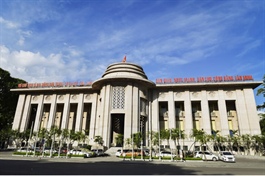Formulating tax laws for modern international trends
Formulating tax laws for modern international trends
According to US Supreme Court Justice Wendell Holmes, Jr, "Taxes are what we pay for civilised society”. And just like the societies we live in, tax laws must evolve and adapt to new circumstances and challenges in order to pay for the provision of government goods and services as well as the infrastructure we rely upon to lead our daily lives.

By Dean Rolfe, partner and head of digital and e-commerce KPMG Vietnam
|
With this challenge in mind, most fair-minded people would probably agree that the profits of a business ought to be subject to some level of taxation. Leaving aside the question of how much taxation is considered fair and reasonable, the question becomes more complex when business profits arise in more than one country.
That is to say, the question then becomes not only how much tax to pay, but who to pay it to? It is precisely this question that has given rise to the controversial topic of taxing the digital economy, especially when businesses can now operate outside territorial boundaries with no physical presence.
Before looking at Vietnam’s proposed solution to this challenge, it is worth understanding the history to the challenge of taxing international commerce and why this has become such a controversial topic.
The historical perspective
International trade is not new and as far back as recorded time, there are many examples. But it was not until the 1920s when the League of Nations was established with 42 founding members on January 10, 1920 that international agreement was sought on how to tax international commerce.
The tax rules that were developed then are largely responsible for the problem we face today. But to be fair to the efforts of those founding members, consider for a moment what international trade looked like back in the 1920s. International trade was almost exclusively the sale of goods and most particularly commodities like natural resources and food. Consider too how this international trade was facilitated. It was largely transported on steel ships (closely resembling small bulk carries) powered by coal. Containerisation was not invented and adopted until the 1950s.
Steam locomotives, as a means of overland transport, were still widely used in Europe as late as the 1960s. Air transportation only really became economically attractive in the 1970s after the development of palletisation and the Boeing 747.
Communication was also very different back then. No mobile phones, internet, or personal computers. Indeed the humble facsimile machine was only adopted as a communication tool during the 1970s. This meant that the ability to conduct international trade was slow and required significant human intervention.
While the personal computer was invented in 1971, its large-scale use really only became a feature of modern society with the reduction in the price of semiconductors. The Commodore 64 was released in 1982 for example and this allowed the adoption of email as a means of mass communication.
Mobile telephone (smartphone) use exploded after Nippon Telegraph and Telephone (NTT) launched the world's first cellular network in Japan in 1983. The first iPhone was of course released in 2007, more than 20 years later.
From the beginnings of .com in 1985, the internet has now exploded in 2017 to over 330 million domain names.
Why is all this relevant to the subject of taxation? Simple, tax laws were developed at a very different point in our economic history when international commerce was very different indeed. From the simple trade in commodities on ships to the digitisation of our global economies, the way we lead our lives today has fundamentally changed.
However, our international tax laws that were designed to collect taxation from international trade have not. It is also worth making the point here, that modern-day taxpayers are not the cause of the problem we face today. Legislators must accept much of the responsibility for this modern-day challenge.
How do international tax rules work today?
As a first step in the process of taxing non-resident businesses is by reference to the domestic tax laws of individual countries like Vietnam. That is to say, the domestic tax law must first contain relevant provisions to tax non-residents with e-commerce activities. However, domestic tax laws are subject to the provisions of any international tax treaties which may be in force at that time.
Without exploring the details of these treaties, there is a fundamental international rule that must be applied. According to the Vienna Convention on the Law of Treaties (which Vietnam is a signatory), any conflicts between domestic (tax) laws and international (tax) treaties must be resolved in favour of international (tax) treaties. Vietnam has currently signed tax treaties and this means individual countries like Vietnam do not always have the freedom to set tax policy in a way they would prefer when that policy direction creates conflicts or contradicts international (tax) treaties. This is the heart of the taxation challenge with e-commerce activities.
There are currently more than three thousand international tax treaties in operation around the work today. While there are many different models used to negotiate international tax agreements, the majority of international tax agreements are based on templates developed by the League of Nations, the United Nations or the OECD. These models have not been updated to accommodate electronic commerce. There are exceptions of course.
And it is because the principles used in these treaties were developed a long time ago, some even more than 50 years ago!
The e-commerce challenge and physical presence
Having considered how our global economy has changed over the past 100 years, it is worth briefly explaining how international tax rules have evolved during that time.
As a starting point, it is worth highlighting that international tax rules were historically developed via international consensus through organisations like the League of Nations, the UN and the OECD.
The genesis of these rules can be traced back to work undertaken in the 1920s by the League of Nations. As already mentioned above, our globally economy looked very different in the 1920s and it was at this time that many of the principles we apply today were developed and agreed. Simply put, the rules we apply today were developed through the lens of international shipping of physical goods on cargo ships.
Critically, the work conducted in 1920 developed the idea of taxing international trade based on physical presence. Some element of physical presence (like warehouses) were excluded because warehouses were not proprietary to one particular business. They were typically large shared spaces. Warehouses were also considered essential to day-to-day movement of food and commodities at that time because containerisation and palletisation had not yet been invented. Representatives were also allowed to operate without triggering a tax presence because communication was so unreliable and slow.
These same taxation concepts were adopted by the OECD in the 1970s when they developed their model tax treaty. The OECD tax treaty is the most widely adopted international tax treaty in use today.
So the profits of a company that was incorporated in one country, would only be taxed in another country if it company had a physical presence in that other country. This is referred to as a "permanent establishment". For completeness, I must highlight that this is a gross simplification of the rules, but this point is this, the basis upon which all our current tax rules have evolved is the notion of physical presence. And business practices in the 20th century, these rules worked extremely well to regulate the taxation of international commerce because, to a large extent, there was a correlation between the generation of profits and physical activity or presence in that location. In summary, there was no real need to change the rules that have served the business community and taxation authorities alike extremely well for so long.
The road to change
However, this taxation nexus with a physical activity or presence has slowly been eroded with the evolution and adoption of technology. Business can now operate in ways that do not require a physical presence in a location where commercial activity is undertaken.
A digital platform can sell a subscription for media or music content to a customer without even needing to have a locally registered domain name, little own a physical presence in the location of the customer. That is to say, our global economy has fundamentally changed, while our international tax laws have not. It is this realisation that has now generated such interest in the taxation of multinational companies.
As already mentioned above, our international taxation principles were developed as far back as the 1920s by the League of Nations with only 42 founding members. The United States of America was not one of them. This limited number of founding members made finding international consensus, on a range of issues, much easier.
Today the OECD is looking at how to modernise our international tax laws and principles through its Base Erosion and Profit Shifting (BEPS) project. This project commenced in 2013 and had 137 members as at December 2019. With this many interested parties, progress on tax reform relating to the digital economy has been very slow indeed.
Action 1 of the BEPS programme was focused on the challenges of taxing the digital economy. In 2020, we are still waiting for international consensus and action on this matter. Progress on the need to update the definition of ‘permanent establishment’ for example and the need to move away from a physical presence as a means to levy taxation seems to have stalled.
The rise of unilateral tax measures targeting e-commerce
With this lack of progress on the reform and modernisation of our international tax rules, it’s hardly surprising to see so many countries announcing the adoption of unilateral measures to tax the digital economy.
In June 2020, there are estimated to be 46 counties who have announced, released draft laws, or enacted new tax laws designed to tax the digital economy. Most of these changes are in the form of changes to VAT or GST laws, but increasingly governments are turning to the introduction of a new tax law called Digital Services Tax (DST).
It would, I propose, be a mistake to suggest these unilateral measures are discriminatory or unfairly targeting companies which may have a headquarters in one particular country. The simple fact of the matter is digital transformation has fundamentally changed every facet of our daily lives and tax laws have not kept pace with this rate of change. Adopting new laws is not discrimination, it is simply being realistic especially when you consider that the global rate of digital transformation is only accelerating. Taxation systems need to evolve with the times if government revenue is to grow along with general economic development.
I should hasten to add that it is not technology companies that are doing the wrong thing or deliberately trying to avoid the payment of taxes they should otherwise pay. This assumption does not, as I have highlighted above, reflect the fact that tax laws simply have not evolved to tax a whole range of digital activities and transactions. Arguing that companies are not paying their ‘fair share’ of tax is a value judgement that ignores the rule of law. Such statements have no place in this discussion.
The Vietnamese response
With effect from July 1, 2020, Vietnam introduced a new tax collection procedure for e-commerce activities. This is called a withholding tax and would be applied at the source of the payment for e-commerce goods and services sold to Vietnamese customers by non-resident e-commerce enterprises.
The idea is to rely on the taxpayers’ responsibility of self-assessment and to use the banking system as a collection agent and this is a unique solution to a problem that has confounded governments around the world. Admittedly this may impose a huge burden on the financial service sector, but it has created in a process that once operational, is likely to result in significant new sources of taxation revenue. Unfortunately, however, it also has the potential to cause significant challenges through the collection of tax that is not due and would, under international rules, need to be refunded.
Many of the operational details are not publicly available at this time and we are awaiting the finalisation of a new Decree and Circular containing detains on the relevant processes and procedures.
What we do know is the General Department of Taxation is working on a new Tax Portal which will be used for the coordination and tax compliance of these new rules. This centralisation is welcome and should help simplify the day to day procedures and ensure greater levels of tax compliance.
Concluding remarks
It is clear that digital transformation is providing many benefits to the societies we live in, but it is also true that governments need tax revenue to provide the goods and services we expect from a civilised society.
























